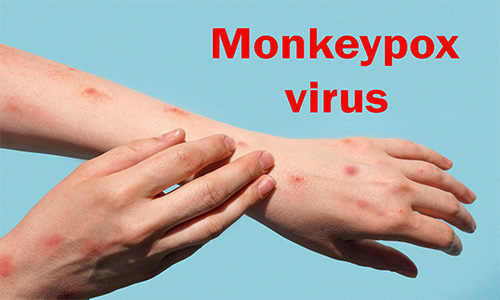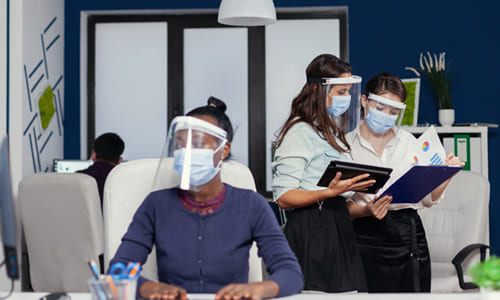AED 1 million Health cover starting @4/Day
Travelling Amid Monkeypox Outbreak – Key Precautions & Safety Measures

The first cluster of Monkeypox was detected in late April 2022, with this viral infection spreading to several countries around the world since. However, given the difficulties brought by the Covid-19 infection, world governments and health organisations are taking precautionary steps to limit the spread of this virus by studying its potential to become a bigger threat than a world health emergency.
In light of the same, multiple travel advisories and isolation protocols have been issued by the government of several nations including the UAE. This piece will cover everything you need to know about travelling amidst the Monkeypox outbreak - from precautions and insurance to isolation.
Monkeypox Outbreak a Global Emergency – WHO
The World Health Organisation (WHO) declared Monkeypox outbreak a public health emergency of international concern on July 23rd, 2022. The infection, which started in Africa, has now spread to 70 different countries across Central and West Africa, North America, and Europe.
Monkeypox has been given an endemic status in African countries. However, the WHO believes that there is still a window of opportunity to control the spread and prevent it from turning into a global endemic or a pandemic like Covid-19.
Is International Travel Safe at the Moment?
Several cases of Monkeypox have already surfaced in numerous countries around the world. Naturally, travelling to a country with Monkeypox cases can expose you to the infection as well. An international travel advisory has been issued by several countries in light of the same.
Travelling internationally is safe if you follow proper precautionary steps as suggested by world governments and health organisations. The key precautions to take while travelling are discussed in detail in the following sections.
Safety Precautions to Take When Travelling Abroad
Given that the Monkeypox outbreak has been declared a global health emergency, it is wise to prepare your precautionary plans before you start travelling. Limiting further infection is the key to preventing the Monkeypox outbreak from turning into an epidemic or pandemic.
A few easy precautionary steps can be followed to prevent Monkeypox infection when you are travelling abroad. These steps are divided into three categories for easy tracking:
Before Your Set Out
- Research about the destination that you are travelling to and check if there is any news related to Monkeypox infection
- If there are any reports related to the outbreak of this virus for the place that you are visiting, gather all the safety gear you such as masks and gloves
- Make sure that you stock up on all the necessary over-the-counter medicines as well. You can also get a prescription from your doctor for any additional medication you need individually
Precautions to Follow During the Trip
- If your destination country already has Monkeypox cases, be extra careful when visiting public places
- Maintain proper hygiene and wash your hands for at least 20 seconds with soap whenever you come to your hotel from outside
- Wear a good-quality mask when you visit public areas as Monkeypox can also spread by inhaling respiratory droplets
- Avoid close and intimate contact with infected people or people who may have been infected
- Use an alcohol-based sanitiser to clean your hands and disinfect surfaces you touch frequently
- Avoid touching any animals infected with the Monkeypox virus. The list of such animals primarily includes rodents and non-human primates.
- Avoid consuming any wild animals during your trip and make sure that you do not use products derived from wild animals either - this can include cosmetics, dairy products, and so on
- Avoid any kind of close physical contact with people who may be at the risk of getting infected with the Monkeypox virus
Once You Are Back Home from Your Trip
Symptoms of Monkeypox may take a few days to appear. Thus, it is advised to take a precautionary PCR test as soon as you return from your trip. This will prove helpful for early detection of the disease in case you have been infected during your trip.
If the test results come positive, you can follow the steps discussed below for isolation during your recovery time.
Isolation Protocol for Monkeypox Infected Individuals
Isolation of 21 days is recommended for all confirmed cases of Monkeypox. The patient here is required to visit a nearby healthcare facility and consult a doctor. If the patient is well enough for home isolation, a few preparations must be made.
To start with, the room in which the patient is being isolated must be well-ventilated. Vital signs of the patient must be stable and rashes must either be mild or completely absent. A healthy adult must be present with the patient in case the latter requires any assistance. The patient must have access to a separate bathroom, first aid kit, thermometer, and sanitation equipment.
It must be kept in mind that recovery may take up to 14 days and the symptoms may persist during this time. You can get another PCR test done once the symptoms have disappeared.
Countries like the UAE, Canada, Netherlands, Belgium, United Kingdom, and St Lucia have made a 21-day quarantine mandatory for confirmed Monkeypox cases. Self-isolation is also required for individuals who have come in contact with a Monkeypox infected person in some countries, like Belgium. You should check if the country that you are travelling to has any special isolation requirements like these.
Symptoms to Look Out For
The following are a few symptoms patients of Monkeypox that may be observed a few days after the infection:
- Swollen lymph nodes
- Chills and weakness
- Fever
- Muscle Pain
- Headache
- Backache
- Fatigue
- Blisters or rashes on the face, inside the mouth, genitals, hands, feet, and so on
Symptoms of Monkeypox may take 5 to 21 days to appear, with the initial symptoms of the disease including fever and headache. Blisters/rashes and swollen lymph nodes may follow the fever after a few days.
A pre-print study in Belgium has shown that several cases of Monkeypox turned out to be asymptomatic. While the study is yet to be peer-reviewed, it indicates that several individuals infected with the Monkeypox virus may have gone undetected due to a lack of symptoms. Consequently, you should make sure that you are ideally prepared as far as precautions are concerned.
Ensure an Additional Layer of Safety with International Health Insurance
International health insurance plans may help you get the financial protection that you require when travelling abroad during Monkeypox outbreaks. Since Monkeypox is an infectious disease, most health insurance plans in the UAE cover it.
International health insurance uae plans offer this coverage worldwide. So if you wish to get proper health cover before setting out on a trip to a foreign country, international health insurance plans may just do the trick for you. Just make sure that you have examined the coverage properly before you finalise the plan.
Key Takeaways
As the saying goes, precaution is better than cure. Be a smart traveller and make sure that you are well prepared with all precautionary measures in place. Moreover, it is advisable to keep a comprehensive insurance plan up and running before you set out on your trip.
One should have a good insurance plan readily available to get the necessary assistance required if they are infected with the Monkeypox virus. Simply staying on top of the suggested precautions can make your international trips a safe success.
Policybazaar UAE – Helping you navigate the wilderness of the insurance world!

- Latest News & Update








